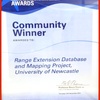
Redmap NSW wins award!
Redmap NSW has just won the Community Award at the Annual NSW Coastal Management Awards. Congratulations!



Redmap NSW has just won the Community Award at the Annual NSW Coastal Management Awards. Congratulations!
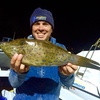
Redmap has received more than 1500 sightings of marine life around Australia that people deemed uncommon in their local seas. This edition of Redmap news reviews the citizen science including the Top 3 sightings per state. Also, read interviews with Redmap members around Australia and other marine news! Check out the newsletter here.
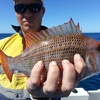
Australian fishers, divers and beachcombers have documented some 1500 sightings of marine life they considered uncommon in their local seas. Many of the Redmap sightings were species out of their usual home range (distribution); and others were valuable observations of rare or poorly-studied species that we'll track over time. And it looks like the scuba divers beat the fishers for uploading the most sightings on Redmap! Here's a snapshot of Redmap's citizen …
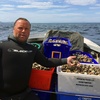
Commercial diver Bryan Denny has no regrets starting his career as a teenager when he'd skip school to fish with local abalone divers. Read about his life on the sea and the changes he's seen over the years.
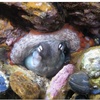
A recent article in The Conversation detailed how Redmap volunteers are helping scientists track movements in marine species around Australia's vast coastline. Read the article here.
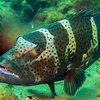
Last summer Victorian diver Paul Sorensen spotted a tropical-looking fish lingering in an abandoned shopping trolley under the Frankston Pier near Melbourne. It turned out to be a tropical species usually found near Queensland reefs.
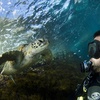
Warming seas and the migration of species will change the marine environment on our doorstep, according to Queensland researchers. Read more in the Sunshine Coast Daily.
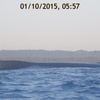
A Gold Coast marine biologist is harnessing the power of social media in a bid to turn everyone into a citizen scientist. Facebook page Humpbacks and High-Rises (HHR) may only have just over 1,000 followers, but almost every one of those followers is engaging in whale watching research and conservation. Read more at The Brisbane Times.
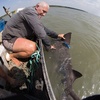
Since the discovery of the Speartooth shark in 1982 there has never been a live adult specimen found anywhere - until now. Actually make that two. Researchers have captured a 2.2m female and a 2.3m male in the waters near Cape York, QLD and fitted them with satellite tags. The tags will last for about 2 months and record where the sharks travel, plus collecting data on depth and temperature …
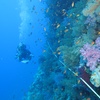
A new study by University of Tasmania researchers and international collaborators has found that a key element of future changes in the distribution of marine biodiversity resulting from ocean warming is not as closely related to local warming rates as previously assumed. Read more in the University of Tasmania News.